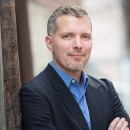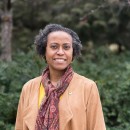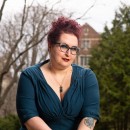School of Social Work News
Pages
- Terri Friedline and So’Phelia Morrow call on President Biden to stop the Predatory Burden of Student Loan Debt in Ms. Magazine
Associate Professor Terri Friedline and PhD student So’Phelia Morrow call on President Biden to stop the predatory burden of student loan debt in an article in Ms.“To advance his promises of racial and gender justice and to better ensure an inclusive economic recovery from the COVID-19 pandemic, President Biden should cancel all student loan debt—not just a meager portion of it.” Their article also cites research conducted by a team at Michigan Social Work, which focuses on the physical and mental health tolls women face due to their debts and outstanding obligations.
- January 28, 2021
- Learn more »
- Olivia Stillman Named a 2021 Dow Sustainability Fellow
MSW student Olivia Stillman has been named a 2021 Dow Sustainability Fellow. Designed to support the next generation of sustainability leaders in business, government, and nonprofits, The Dow Sustainability Fellows Program is among the most prestigious and productive graduate programs at U-M. Fellows are selected through a competitive process from a pool of applicants nominated by their academic units.
During the year-long program, Stillman will work collaboratively with the cohort to solve real-world sustainability challenges. Each fellow receives a $20,000 stipend, along with sustainability skills-development opportunities and professional experience working on a team with an external client.
“I am excited and honored to learn that I was chosen for the Dow Fellowship. I consider myself to be a scholar and advocate of interdisciplinary collaboration, especially when it comes to issues of sustainability. It is impossible to be an expert on everything and I think it is absolutely essential to know where and how to find help from experts in other fields. I am also excited to bring the social work perspective into discussions of sustainability, especially since I believe the values of social work are often underrepresented in this area of study,” says Stillman.
- January 27, 2021
- Learn more »
- Ongoing Cover Wins CASE Award
The Michigan Social Work marketing and communications team has won a Pride of CASE V Award for the fall 2019 cover of Ongoing. Niki Williams’ photo of Juliana Huxtable — taken during her February 2019 performance presented by the School — makes use of lasers and fog to frame the artist. CASE is the Council for Advancement and Support of Education, a global non-profit association dedicated to educational advancement, alumni relations, communications, development, marketing and advancement services.
- January 21, 2021
- Learn more »
 Luke Shaefer Quoted on Biden’s Child Poverty Plan in the New York Times
Luke Shaefer Quoted on Biden’s Child Poverty Plan in the New York TimesProfessor Luke Shaefer spoke with the New York Times about Biden’s child poverty plan. “This is the boldest vision laid out by an American president for fighting poverty, and child poverty in particular, in at least half a century,” said Shaefer.
- January 21, 2021
- Center for Equitable Family & Community Well-Being Lead Ypsilanti COVID-19 Study
Researchers at the Center for Equitable Family & Community Well-Being surveyed more than 600 low-income residents across Ypsilanti about the impact of COVID-19. Their work is giving voice to the needs of those disproportionately impacted by the pandemic, ensuring that local health and economic responses attend to issues of equity.
The Ypsilanti COVID-19 Study is a collaboration between Eastern Michigan University’s Family Empowerment Program, the Washtenaw County Racial Equity Office, and the Center for Equitable Family & Community Well-Being within the U-M School of Social Work.- January 20, 2021
 Trina Shanks Named a 2021 Society for Social Work and Research Fellow
Trina Shanks Named a 2021 Society for Social Work and Research FellowTrina Shanks, Harold R. Johnson Collegiate Professor of Social Work is named a 2021 Society for Social Work and Research Fellow. The Society for Social Work and Research Fellows are members who have served with distinction to advance the mission of the Society — to advance, disseminate and translate research that addresses issues of social work practice and policy and promotes a diverse, equitable and just society. SSWR Fellows serve as role models and mentors for individuals pursuing careers in social work research.
- January 19, 2021
- Learn more »
 Shanna Kattari Receives the Society for Social Work and Research 2021 Deborah K. Padgett Early Career Award
Shanna Kattari Receives the Society for Social Work and Research 2021 Deborah K. Padgett Early Career AwardAssistant Professor Shanna Kattari has received the Society for Social Work and Research (SSWR) 2021 Deborah K. Padgett Early Career Award, which recognizes an individual in their early career who is making a notable impact in their profession. Her accomplishments reflect innovative scholarship, a rigorous approach to social work research and work that exhibits an emerging influence in the field.
“I am so honored to receive this award; as someone whose focus on community engaged research and areas that are often less explored in the field of social work, I am delighted that this research is being recognized for the impact it has on the communities with whom I partner. I could not have done any of this on my own, and am so appreciative for all of the labor and support these communities have provided to help make this research possible,” said Kattari.
Kattari will receive the award at the SSWR virtual meeting award presentation, which will be live streamed on Thursday, January 21, 2021, 2:30 – 3:30 PM, EST.
- January 18, 2021
- Learn more »
- Rosalva Osorio and Meghan Thiel Selected as U-M Interprofessional Leadership Fellows
Field Faculty Rosalva Osorio and Field Instructor Meghan Thiel have been selected as U-M Interprofessional Leadership Fellows. The program provides faculty members with opportunities to learn from and work with health sciences academic and practice leaders, at both the university and national level, and equips them to be interprofessional educator scholars, effective leaders and change agents.
- January 18, 2021
- Learn more »
 William Elliott and Sophia Nielsen on Reducing Poverty and Promoting Economic Mobility
William Elliott and Sophia Nielsen on Reducing Poverty and Promoting Economic MobilityProfessor William Elliott III and MSW student Sophia Nielsen write about reducing poverty and promoting economic mobility through Child Savings Accounts and other short-term and long-term education investments in College Promise’s latest newsletter.
- January 13, 2021
- Learn more »
- PhD Student Charles Williams II Addresses African Americans Distrust of Vaccine
PhD Student Charles Williams II spoke with the Detroit Free Press about the skepticism in Black communities about the COVID-19 vaccination. As a clergy member who interacts with patients in hospital settings and in his church, Williams qualified to get an early vaccine. He hopes to convince his church members that the vaccine is safe. “As a leader, as a pastor… if I have to be the one to get my arm poked so folks can feel a little bit comfortable about them doing it, so be it,” said the Rev. Charles Williams II, current PhD student.
- January 11, 2021
- Learn more »